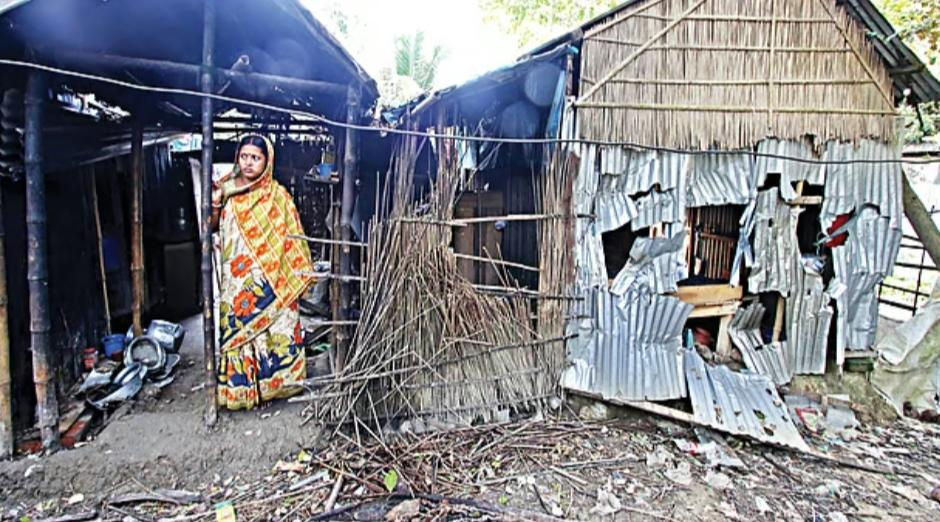Published: 06:30 PM, 30 October 2025
Nine Years After Nasirnagar: The Scars That Refuse to Fade

Sangram Datta: NASIRNAGAR, BRAHMANBARIA — On an October morning in 2016, this quiet riverside town in eastern Bangladesh descended into chaos.
What began as an accusation over a Facebook post turned into one of the most violent communal attacks in recent memory. Mobs stormed Hindu temples and homes, torching and looting with impunity. The air filled with smoke, the cries of families, and the collapse of centuries of coexistence.
According to a report by the Bangladeshi daily Prothom Alo, published on October 30, 2023, the wounds from that day have not yet healed. Most of the cases remain stalled in court, and one man — Rosoraj Das, a poor fisherman accused of the Facebook post that allegedly sparked the violence — still lives under a cloud of suspicion.
A Day of Fire and Fear
The Prothom Alo investigation recounts how, on October 30, 2016, two Islamist groups — Ahle Sunnat Wal Jamaat and Khati Ahle Sunnat Wal Jamaat — called separate rallies in protest of an alleged blasphemous post on Facebook.
As crowds swelled, anger spiraled into frenzy. Within hours, mobs vandalized 15 Hindu temples and set fire to more than 300 homes.
Nasirnagar, a place once known for its communal harmony, was left smoldering.
A Fisherman at the Center of the Storm
At the heart of the allegations stood Rosoraj Das, a fisherman from Harinber village. Accused of sharing an image mocking Islam, he was arrested and detained.
Yet, according to Prothom Alo, forensic investigations by the Police Bureau of Investigation (PBI) and the Criminal Investigation Department (CID) found no evidence of the alleged post on his Facebook account, mobile phone, or memory card.
Despite that, police filed charges under the Digital Security Act of 2018. Rosoraj continues to appear in the Cyber Tribunal in Chattogram, nearly nine years later.
“I’ve gone to court in Chattogram seven or eight times,” he told Prothom Alo.
“I make my living fishing in the river. Each trip costs me about 5,000 to 6,000 taka. It’s a struggle just to survive. I want to be free — to live a normal life again.”
Justice Delayed
Eight separate cases were filed in connection with the Nasirnagar violence, implicating nearly 3,000 people.
As Prothom Alo reported, only one of those cases has reached a verdict. In March 2024, a court in Brahmanbaria sentenced 13 people — including local political leaders — to four years in prison and fined them 2,000 taka each.
Five of those convicted remain fugitives. The other seven cases are still pending; one has been transferred to the Chattogram Cyber Tribunal, while the rest linger in local courts, mired in witness examinations and procedural delays.
A Mystery Unsolved
“Finding no forensic trace means Rosoraj never made the post,” said Nasir Mia, Rosoraj’s defense lawyer.
“Six different investigating officers over five years couldn’t uncover the truth.”
But Mohammad Iqbal Hossain, the final investigating officer, maintained otherwise.
“Forensic analysis indicated that Rosoraj posted the image, later apologized, and deleted it,” he told Prothom Alo.
The contradiction underscores a deeper uncertainty — one that has allowed the case to drag on while its accused remains trapped in limbo.
Fear That Lingers
Nine years on, Nasirnagar bears its scars quietly.
Many families have rebuilt their homes, but not their sense of safety.
“Every festival season, our hearts still race,” said one Hindu resident, who asked not to be named for fear of reprisal. “We fear it could happen again.”
In the narrow lanes near the temples, the soot has long been scrubbed away, but the memories persist — of neighbors turning against neighbors, of sacred idols shattered under the weight of anger.
A Country Still Searching for Reconciliation
The Nasirnagar attack remains a stark reminder of Bangladesh’s fragile pluralism.
A nation founded on secular ideals, it continues to wrestle with questions of faith, identity, and justice.
For Rosoraj Das, the man accused but never proven guilty, those questions are not abstract. They define his daily struggle — between hope and despair, between survival and stigma.
The flames that burned through Nasirnagar may have been extinguished years ago.
But their embers still glow — in the courts, in the memories of its survivors, and in the conscience of a country still learning how to protect its own harmony.




